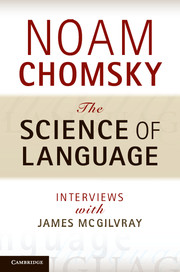Book contents
- Frontmatter
- Contents
- Introduction
- Part I The science of language and mind
- 1 Language, function, communication: language and the use of language
- 2 On a formal theory of language and its accommodation to biology; the distinctive nature of human concepts
- 3 Representation and computation
- 4 More on human concepts
- 5 Reflections on the study of language
- 6 Parameters, canalization, innateness, Universal Grammar
- 7 Development, master/control genes, etc.
- 8 Perfection and design (interview 20 January 2009)
- 9 Universal Grammar and simplicity
- 10 On the intellectual ailments of some scientists
- 11 The place of language in the mind
- 12 Chomsky's intellectual contributions
- 13 Simplicity and its role in Chomsky's work
- 14 Chomsky and Nelson Goodman
- Part II Human nature and its study
- Appendices
- Commentaries
- Glossary
- Bibliography
- Index
12 - Chomsky's intellectual contributions
from Part I - The science of language and mind
Published online by Cambridge University Press: 05 June 2012
- Frontmatter
- Contents
- Introduction
- Part I The science of language and mind
- 1 Language, function, communication: language and the use of language
- 2 On a formal theory of language and its accommodation to biology; the distinctive nature of human concepts
- 3 Representation and computation
- 4 More on human concepts
- 5 Reflections on the study of language
- 6 Parameters, canalization, innateness, Universal Grammar
- 7 Development, master/control genes, etc.
- 8 Perfection and design (interview 20 January 2009)
- 9 Universal Grammar and simplicity
- 10 On the intellectual ailments of some scientists
- 11 The place of language in the mind
- 12 Chomsky's intellectual contributions
- 13 Simplicity and its role in Chomsky's work
- 14 Chomsky and Nelson Goodman
- Part II Human nature and its study
- Appendices
- Commentaries
- Glossary
- Bibliography
- Index
Summary
JM: Noam, let me ask about what you take to be your most important contributions. Do you want to say anything about that?
NC: Well, I think that the idea of studying language in all its variety as a biological object ought to become a part of future science – and the recognition that something very similar has to be true of every other aspect of human capacity. The idea that – there was talk of this in Aspects, but I didn't really spell it out – the belief . . .
[Wait; I'll start over. B. F.] Skinner's observation is correct that the logic of behaviorism and the logic of evolution are very similar – that observation is correct. But I think his conclusion – and the conclusion of others – is wrong. Namely, that that shows that they're both correct. Rather, it shows that they're both incorrect, because the logic of behaviorism doesn't work for growth and development, and for the same reason, the notion of natural selection is only going to work in a limited way for evolution. So there are other factors. As I said in Aspects, there's certainly no possibility of thinking that what a child knows is based on a general procedure applied to experience, and there's also no reason to assume that the genetic endowment is just the result of various different things that happen to have happened in evolutionary history. There must be further factors involved – the kind that Turing [in his work on morphogenesis] was looking for, and others were and are looking for. And the idea that maybe you can do something with that notion is potentially important. It's now more or less agreed that you can do something with that notion for, say, bacteria. If you can also do something with it for the most recent – and by some dimension most complex – outcomes of evolutionary history like language, that would suggest that maybe it holds all the way through.
- Type
- Chapter
- Information
- The Science of LanguageInterviews with James McGilvray, pp. 76 - 79Publisher: Cambridge University PressPrint publication year: 2012



